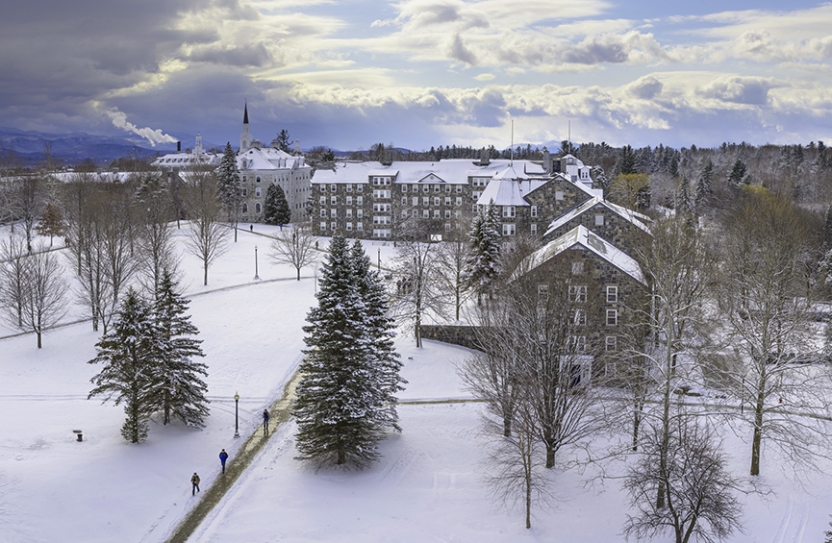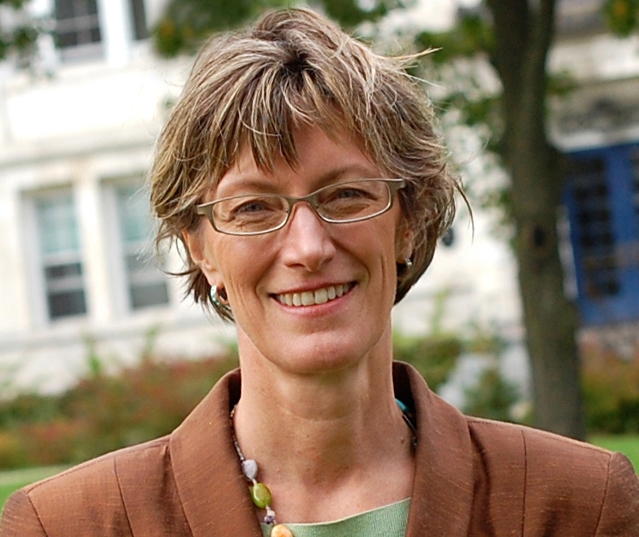Winter Term Explores Islam in America, Diplomacy, Hate Speech, and Other Topics

MIDDLEBURY, Vt. – Students will return to campus on Monday, January 11, for the four-week winter term that is both an integral component of the curriculum and a time-honored tradition at Middlebury College.
With classes about Islam in America, crisis diplomacy, and hate speech, it is evident that some 2016 winter term courses are a direct reflection of the upheaval in the world today. Other top-of-the-news subjects to be covered this January are environmental activism, drones and surveillance, computer systems security, international health, American power, and the impact of humans on the world’s oceans.
Middlebury’s winter term enables undergraduates to focus their attention on a single course, and the immersive experience often leads to new opportunities for learning and discovery.
Complementing this month’s highly topical subjects are courses in 13 foreign languages (including American Sign Language) along with classes in literature, the performing and visual arts, humanities, and the social and natural sciences. Most students have registered for one of the 117 faculty-led courses, while others will pursue independent projects or internships with college approval. All on-campus courses convene for a minimum of eight hours per week, and most meet for more time with field trips, guest lecturers, discussion sessions, and films.

The Crisis Diplomacy course with Allison Stanger, professor of international politics and economics, will utilize the Council on Foreign Relations’ “model diplomacy simulation suite” to illustrate exactly how American foreign policy is formed.
“Policymakers operate in a complex environment that demands emotional intelligence, strategic vision, thoughtful analysis, and creative and concise argument,” said Stanger, “and we will recreate that environment in this class.
“Students will finish the course with a better understanding of the unanswerable questions of international conflict, as well as the skills desirable for government careers in diplomacy and security.”
Islam in America, taught by Assistant Professor Ata Anzali, will look closely at Muslim women in the U.S., the complex relationship between African Americans and Islam, and the state of immigrant Muslim communities in the U.S.
Professor Erik Bleich’s Free Speech vs. Racist Speech in the U.S. and Europe will debate the appropriate limits on speech in light of the Danish cartoon controversy, Holocaust denial cases, and the French magazine Charlie Hebdo.
Since the founding of winter term in 1969, Middlebury has also invited an impressive array of visiting instructors to campus – many of whom are Middlebury alumni – to supplement the classes taught by members of the faculty.
Among this month’s visiting instructors are William K. Sessions ’69, a U.S. District Court justice, teaching Constitutional Rights of the Accused; Kelly Bennion ’10, a doctoral candidate in cognitive and affective neuroscience, offering a course on The Sleeping Brain; and planetary geologist Charles Frankel ’79 teaching Mars: Geology, Evolution, and Exploration.
Also, Chelsea Minton ’08, a geospatial expert for start-up companies, is instructing how businesses use GIS technology to improve productivity. James Douglas ’72, the former governor of Vermont, is offering a class on state government. Claire Luby ’10, a Ph.D. candidate in plant genetics, is examining how seeds relate to human well-being. Khalid Quadir ’90, a managing partner in a private equity firm, is leading a course about investment opportunities in developing nations. And Jennifer Crystal ’00 of Boston’s Grub Street Creative Writing Center is conducting a workshop-style class on writing as a tool for healing.
This January there is even a course designed and directed by a current student, August Hutchinson ’16.5. His class on the great debates in world history will be advised by William Hart, professor of history.
Commonly known as “J-term,” the winter term at Middlebury was first recommended by the Faculty Educational Policy Committee in February 1968 as part of a major revision to the curriculum. Up to that time, students enrolled in five courses per semester and the fall semester lasted until mid- to late-January. The 1968 faculty voted 69 to 29 to install the proposed 4-1-4 curriculum that following fall, and winter term has been a part of the Middlebury experience ever since.
Undergraduates will complete the 2016 winter term on Friday, February 5, and return to campus for the start of spring semester on Monday, February 15.

